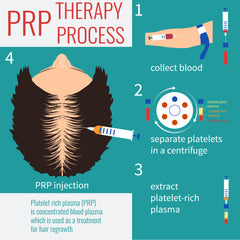What is Platelet-Rich Plasma?
Autologous Platelet-Rich Plasma, also known as PRP, is a high concentration of your own platelets in a small volume of plasma.
What is PRP therapy?
PRP therapy was developed based on new medical research and the advancement of technology within the medical community. Scientific studies recently published have reviewed PRP hair restoration technique as a noninvasive, all-natural procedure that’s been found to stimulate hair regrowth as well as reduce the effects of thinning. In one study that was published in the Dermatologic Surgery, Italian physicians conducting research found they were able to successfully use PRP in their clinical trial.
How can PRP aid in treating hair loss?
PRP therapy for hair regrowth works on the basis on utilizing growth factors within the platelets. There are seven growth factors that exist in normal platelets. These growth factors enter the hair bulb circulation and stimulate the stem cells. This promotes changes in the follicle.
Who is a good candidate for PRP hair rejuvenation therapy?
Typically, the best candidates for PRP therapy treatments are those that do not have a history of Telogen Effluvium or scarring Alopecia.
How does a provider harvest PRP?

What are the growth factors and effects?
- Transforming Growth Factor (TGF) promotes angiogenesis, which is the physiological process involving the synthesis of new blood vessels.
- Vascular Endothelial Growth Factor (VEGF) is an important signaling protein involved in both angiogenesis, promoting the growth of blood vessels from pre-existing vasculature.
- Fibroblast Growth Factor (FGF) promotes angiogenesis, granulation, epithelialization and Platelet-Derived Growth Factor (PDGF) and attracts macrophages and fibroblasts to the application site. This promotes collagen growth and proteoglycan synthesis and the formation of the extracellular mix, also known as fibrin mesh.
- Interleukins, Macrophages, Keratinocytes, Endothelial Cells, Lymphocytes, Fibroblasts, Osteoblasts, Basophils, Mast Cells activate fibroblast differentiation. This induces collagen and proteoglycan synthesis for healthy cell production and repair of damaged tissues.
- Collagen Stimulating Growth Factor stimulates granulocyte and macrophage proliferation for the growth of healthy tissue and blood cells.
- Keratinocyte Growth Factor (KGF) promotes Keratinocyte migration, differentiation, and proliferation and may optimize conditions.
How long does a PRP blood draw & processing take?
The blood draw takes just a couple of minutes, followed immediately by a 10minute centrifugation. The time involved in the application varies based on which procedure is being performed.
How is PRP therapy for hair loss performed?
The procedure can vary by practitioner based on your hair regrown needs and the regimen being utilized. Typically, the PRP procedure itself is convenient and nonmedically invasive. Upon visiting the office, a medical professional will draw blood and process it to harvest the PRP as described above. Next, the practitioner will likely provide the option of using a topical anesthesia. Once the scalp is prepped, the provider will inject your scalp with the platelet rich plasma (PRP). The PRP stimulates the follicles so that your hair can begin to regrow.


How many PRP therapy sessions are required?
Your medical professional can create a treatment plan based on your individual needs. Some patients choose to have PRP performed monthly for four months. This ensures that the hair follicles remain stimulated and that hair growth is progressing, as it should be.
Can a PRP procedure be painful?
Eclipse PRP ® is close to a physiologic pH, which means the product is less likely to cause a stinging or burning sensation. There may be some temporary discomfort or possible redness and inflammation at the application site, but quickly resolves.
Is PRP safe?
Since the autologous Platelet-Rich Plasma (PRP) is produced from a patient’s own blood, there is virtually no risk of an allergic reaction or rejection.
Is PRP FDA cleared?
The PRP process, including the device for separating plasma, has been cleared by the U.S. Food and Drug Administration. It should be noted that specifically injecting into the scalp to treat hair loss has not yet been reviewed. PRP has already been used effectively and safely in many other medical fields, including: Orthopedics, Sports Medicine, Cosmetic Surgery, Oral Surgery and Neurosurgery. In addition, PRP has and continues to be part of ongoing clinical trials and studies that have shown success in hair regrowth. PRP is in its early stages of scientific research and subsequent FDA approval. PRP is not intended to replace the current FDA-cleared options such as DHT blockers (ie: Propecia) and Minoxidil. At this time, PRP therapy is a very promising and realistic option for those looking for was to combat hair loss.


